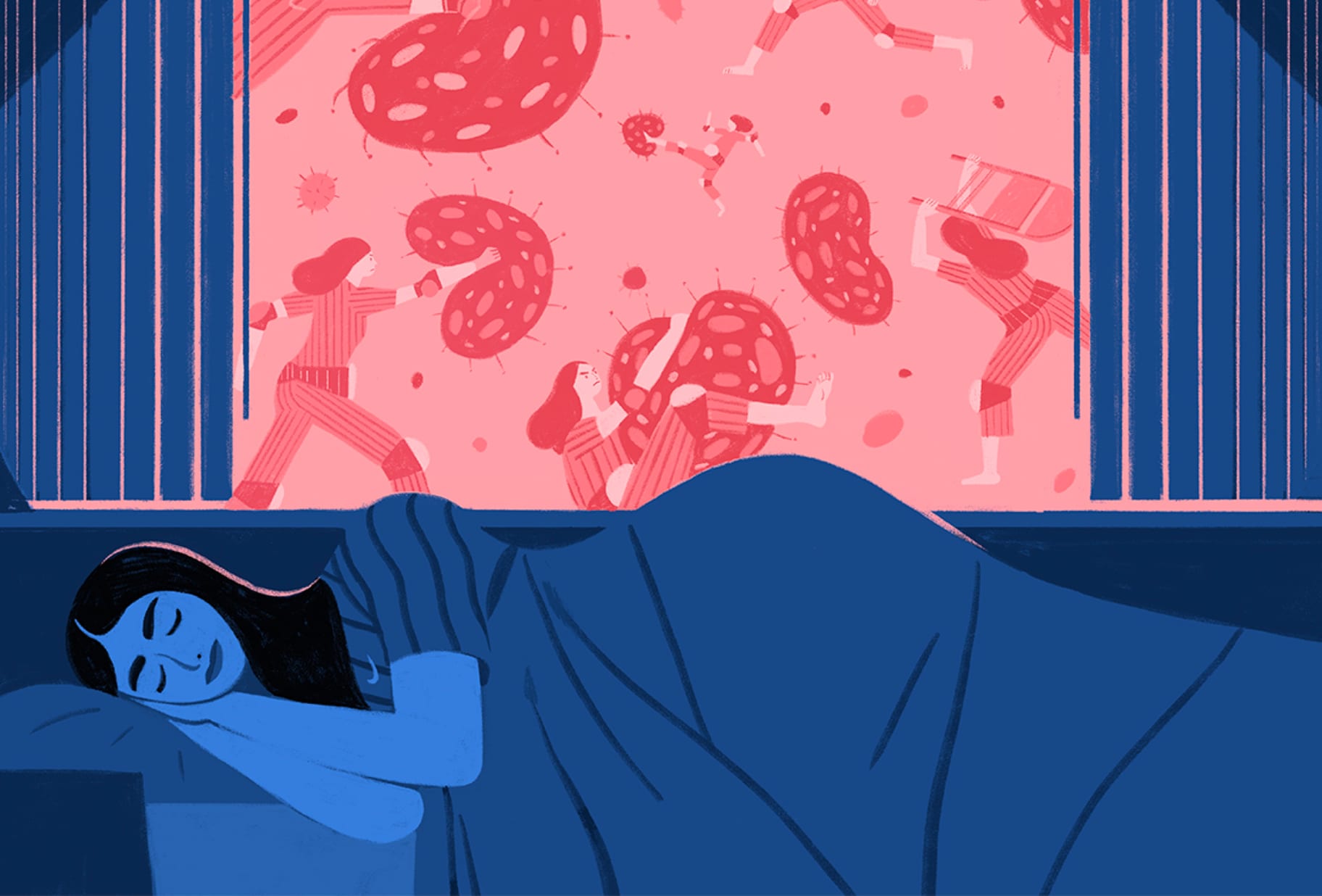How Sleep Affects Your Immune System
Coaching
When you're powered down, your body creates antibodies to help protect you against intruders. Sleep better and stay well with these three tips.

If all this talk about staying safe and healthy in stressful times makes you want to lie down and take a nap, well, you should.
Sleep plays a major role in strengthening your immune system, especially considering you're just lying there.
How Your Immune System Works
Quick biology refresher: Your immune system is a complex network of cells and proteins that serves as your body's first and best line of defence against harmful viruses and bacteria. To strengthen it, you want to focus on other areas of wellness—in this case, sleep—that directly affect the network.
"There's strong evidence that the immune system goes to work while we sleep", says Aric Prather, PhD, an associate professor of psychiatry and behavioural sciences at the University of California, San Francisco. And that without proper sleep, people are more vulnerable to pathogens.
In fact, Prather led a study where the research team sprayed the common cold virus directly into participants' noses. What they found: The people who slept six or fewer hours a night on average were more than four times more likely to come down with a cold than those who slept an average of seven hours or more per night.
Why does a lack of sleep take such a toll on your immune system? For starters, your body produces fewer T cells, the fighter cells that search for and destroy intruders, when you don't log enough Zs. You produce T cells when you're awake too. But if you're not sleeping well, your body might spend more time addressing wear and tear than making T cells.
"Sleep is when your body and brain consolidate information from the day to create both memories and antibodies".
Logan Schneider
MD, Affiliate Clinical Assistant Professor of Sleep Medicine at Stanford University
Then there's the fact that "sleep is when your body and brain consolidate information from the day to create both memories and antibodies", says Logan Schneider, MD, an affiliate clinical assistant professor of sleep medicine at Stanford University. Antibodies are proteins specifically created to target—and remember—a particular pathogen, and they're the reason you become immune to, say, the chickenpox once you've had it.
Dr Schneider says this might explain why the flu jab seems to be ineffective for a lot of people. "We've noticed that people tend to have a lower immune response to vaccines when they're sleep-deprived", he says, noting there's research to support the connection.
You probably know that most adults need to log at least seven hours of sleep a night. But quality matters just as much as quantity. "It's during deep sleep [a non-REM stage of sleep] that the body takes a short-term memory of an infection and turns it into a long-term memory so that we can fight it more effectively in the future", says Dr Schneider.
If you need a little help getting that better, deeper sleep, try these three tricks:

01. Break a sweat.
Dr Schneider says exercise is the best way to promote high-quality sleep because it (a) can make it easier to conk out, especially when you do it earlier in the day, and (b) helps promote that restorative deep sleep. Aim for at least 150 minutes of moderate-intensity aerobic activity weekly, as well as strength training at least two days a week, consistent with the American Heart Association's recommendations. Just make sure not to overdo it, as some research suggests overtraining can cause inflammation that can actually distract your immune cells from tackling any intruders.
02. Cut back on alcohol.
A nightcap may help you fall asleep, but you could pay in quality later in the night. Research shows that alcohol can activate a brain pattern associated with rest—not sleep—prohibiting the truly restorative kind of shut-eye. If you do feel the urge for a drink (and you're of legal age), keep it to one, at least a couple of hours before bed, and pair it with food so your body has time to metabolise the booze to minimise its effects, says Dr Schneider.
03. Avoid obvious interrupters.
Frequent or prolonged wake-ups in the middle of the night can prevent you from entering the most restorative stages of the sleep cycle, says Dr Schneider. Try to stop eating (and maybe even drinking water) two to three hours before you hit the hay to avoid being woken up by your digesting stomach (or bladder).
Ultimately, sleep is your best friend whether you're healthy and trying to stay that way or you're coming down with something. In the latter case, you'll probably feel more tired than usual anyway. So do yourself a favour and listen to your body—it's actually pretty smart.
Take It Further
For more expert-backed guidance on recovery, as well as mindset, movement, nutrition and sleep, check out the Nike Training Club App.
Take It Further
For more expert-backed guidance on recovery, as well as mindset, movement, nutrition and sleep, check out the Nike Training Club App.